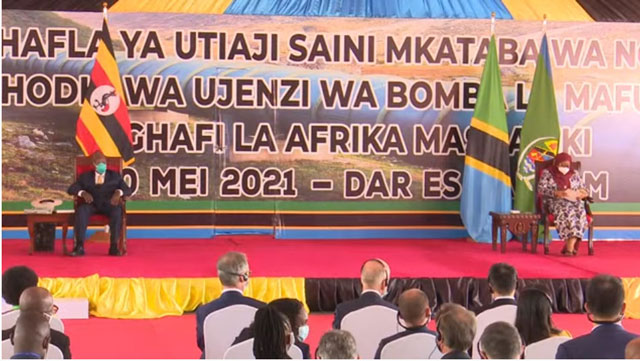
Kampala, Uganda | THE INDEPENDENT | The government has tabled before Parliament a draft law through which Ugandans will be given priority for use of labour and other resources, during the construction of the East African Crude Oil Pipeline (EACOP).
The proposed law tabled by the Minister of State for Energy and Mineral Development, Opolot Okasai, seeks to fully implement the obligations of Uganda under the Intergovernmental Agreement signed between Uganda and Tanzania and the Host Government Agreement signed between Uganda and the East African Crude Oil Pipeline Company Lt.
“…some of the matters agreed upon in the Intergovernmental Agreement and the Host Government Agreement… are either not covered by the existing law or are inconsistent with the existing law. This Bill, therefore, seeks to complement the already existing applicable laws by enabling aspects of the project that are inconsistent with or not provided for under those laws,” reads part of the Bill.
The Host Government Agreement makes the enactment of enabling legislation a pre-condition for its full effectiveness. Minister Okasai says that without the enactment of the EACOP Bill, the Host Government Agreement would not be fully effective and it would not be possible to fully implement the oil pipeline project in Uganda.
The lnter-governmental Agreement (lGA) is the foundation of the oil pipeline project and marked the decision for both Uganda and Tanzania to embark on developing the longest electrically heated crude oil export pipeline in the world. These will be implemented alongside the Shareholders Agreement which details obligations and shareholders structures, and the Tariff and Transportation Agreement which is between the Pipeline Company and the Shippers of Uganda’s crude oil.
The first commercial oil production in Uganda is projected to start in 2025, roughly two decades after commercially viable oil deposits were discovered. Once fully developed, the 1,443-kilometre EACOP will transport crude oil from the oil fields in the districts of Buliisa, Hoima, Nwoya, Kikuube to Chongoleani terminal in Tanga at the Indian Ocean coast in Tanzania.
Uganda’s section of the pipeline project is about 296 kilometres running through 10 districts, 25 sub-counties, 172 villages and affecting at least 4,121 persons. Construction works are expected to start in the second quarter of 2022 in Tanzania where acquisition of land for project right of way is fast-moving.
The project is expected to cost at least USD 3.8 billion (13 trillion Shillings) pooled through the EACOP holding company that is co-owned by the oil companies- Total E&P and China National Offshore Oil Company (CNOOC) and the governments of Tanzania and Uganda through the national oil companies.
Some of the remedies proposed by the Bill are to provide for the tariff regime applicable to the project during the different phases of operation, like the construction period and operation period, enable government and the Uganda National Oil Company to pay the transportation tariff in kind, ensure that the EACOP project obtains the required authorizations in a timely manner, grant and protect the land rights of the project including the enabling of the government to support the project in the acquisition of land and others.
The others are defining the local content regime applicable to the project and ensure that Ugandan citizens and enterprises optimally benefit from the project through prioritization, ring-fencing and joint ventures among others, guarantee third party access to the pipeline and define the tariff to be paid by the third parties to ensure that crude oil from any future discoveries can easily be commercialized and act as an incentive to encourage further exploration in the country and others.
The proposed law also provides for decommissioning of the project after cessation of activities, define the force majeure events applicable to the project in cases of failure or delay in performance of obligations arising from acts of god or related causes outside the control of the party, provide for the procedure for transfer and assignment of rights and obligations, ensure access to electricity by the project, enable the fiscal regime for the project based on the incentives granted by the governments of Uganda and Tanzania and others.
****
URN
 The Independent Uganda: You get the Truth we Pay the Price
The Independent Uganda: You get the Truth we Pay the Price






Good